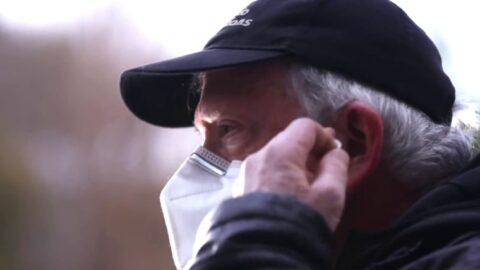
A nurse at an Oregon hospital allegedly replaced pain medication with nonsterile tap water, introducing bacteria into a patient’s bloodstream that led to his death, a lawsuit filed this week alleges.
The patient, Horace Wilson, was admitted to Asante Rogue Regional Medical Center in Medford with a lacerated spleen and broken ribs after he fell off a ladder in January 2022, the complaint says. As he recovered from multiple operations in the intensive care unit, Wilson’s treatment team noticed “unexplained high fevers, very high white blood cell counts, and a precipitous decline,” the suit says. He died in the hospital on Feb. 25, 2022.
“He was only 65, good health — so he should have been able to recover from this,” said Justin Idiart, the attorney who filed the lawsuit.
Wilson’s treatment team obtained blood cultures during his hospitalization that were positive for Staphylococcus epidermidis, a type of bacteria that is believed to have been introduced by the tap water, the lawsuit adds.
The suit, filed on behalf of Wilson’s estate and his wife, Patti Wilson, names both Asante and Dani Marie Schofield, the nurse who allegedly swapped out the medication, as defendants, accusing them of negligence. Schofield did not respond to multiple requests for comment. Records from the Oregon State Board of Nursing show that she voluntarily agreed in November to a nursing license suspension, pending “completion of an investigation.”
Asante Rogue Regional Medical Center, a 378-bed hospital, also did not respond to multiple requests for comment this week, but told NBC News in a statement in January that it was “distressed to learn of this issue” and had reported it to law enforcement.
The civil lawsuit seeks nearly $11.5 million and appears to be the first legal action taken since Medford, Oregon, police confirmed in January that they were investigating reports of drug theft at Asante.
The allegations of drug diversion — a term that refers to misappropriating prescribed medications, sometimes to abuse or illegally distribute them — were first made public by NBC affiliate KOBI-TV in Medford. The station reported in December that at least one patient at Asante had died after a nurse allegedly switched their pain medication with tap water.
The Medford Police Department has declined to comment on how many patients may have been victims of the alleged drug diversion.
In a statement Wednesday, the department said that it is “actively investigating allegations of theft and misuse of controlled substances by an employee of Asante Rogue Regional Hospital.” Police did not identify who was being investigated and added that “no one has been charged with a crime as a result of this investigation.”
“Since December 2023, investigators have been diligently working on this case,” the statement said. “Numerous interviews have been conducted, with many more yet to be completed. We are meticulously reviewing thousands of documents, including medical records, which require thorough examination and consultation with experts in the medical field.”
The wrongful death lawsuit alleges that Asante began notifying patients or their families in December that a nurse had replaced fentanyl with tap water, causing bacterial infections.
Idiart said Wilson’s family was not among those contacted, but once his relatives heard the reports of drug diversion, they suspected Wilson had also been a victim.
“They saw this turn for the worse and couldn’t get good explanations from Asante of what was going on,” Idiart said, adding that the family observed “reactions like he was in pain, even though he was supposed to be sedated a lot of that time.”
The lawsuit alleges that during Wilson’s hospitalization, Schofield had been told to attach bags of the powerful painkiller fentanyl to a programmable pump, which delivered the medication to Wilson through a central line.
Central lines are tubes placed in large veins to administer medication. Bacteria and other germs can enter the bloodstream if the line isn’t inserted or cleaned properly, or if the fluid being administered isn’t sterile.
Allowing tap water directly into the bloodstream is not safe because a waterborne pathogen could enter the body and cause an infection. In hospitals, sterile bags of saline solution are commonly administered intravenously for a variety of clinical purposes, including to treat dehydration.
Schofield marked in Wilson’s chart “on several dates” that he had received fentanyl, the lawsuit says, when instead, the bag allegedly contained water.
During his hospitalization, Wilson’s condition rapidly deteriorated to multisystem organ failure, according to the complaint. He required a tracheostomy to help him breathe.
“Eventually, Horace Wilson was weaned from sedation and recovered enough mental function to communicate to the ICU staff that he no longer wished to live this way,” the lawsuit says.
Idiart said he is investigating more potential claims connected to Asante. After police announced the investigation, “we started getting lots of calls,” he said.
Two other lawyers told NBC News that they too have heard from people who are worried that they or their loved ones were affected by the alleged drug diversion. The lawyers are in the process of investigating those accounts but have not yet filed lawsuits.
David deVilleneuve, an attorney in southern Oregon, said some families he has spoken to are haunted by the possibility that their loved ones might have survived had they received proper care. Compounding their grief is the worry that the patients may have suffered due to a lack of pain medication, he added.
“It’s a different process of mourning and grieving when you go from ‘My loved one died of natural causes’ versus ‘My wife was killed, or negligently killed,’” deVilleneuve said.










Recent Comments